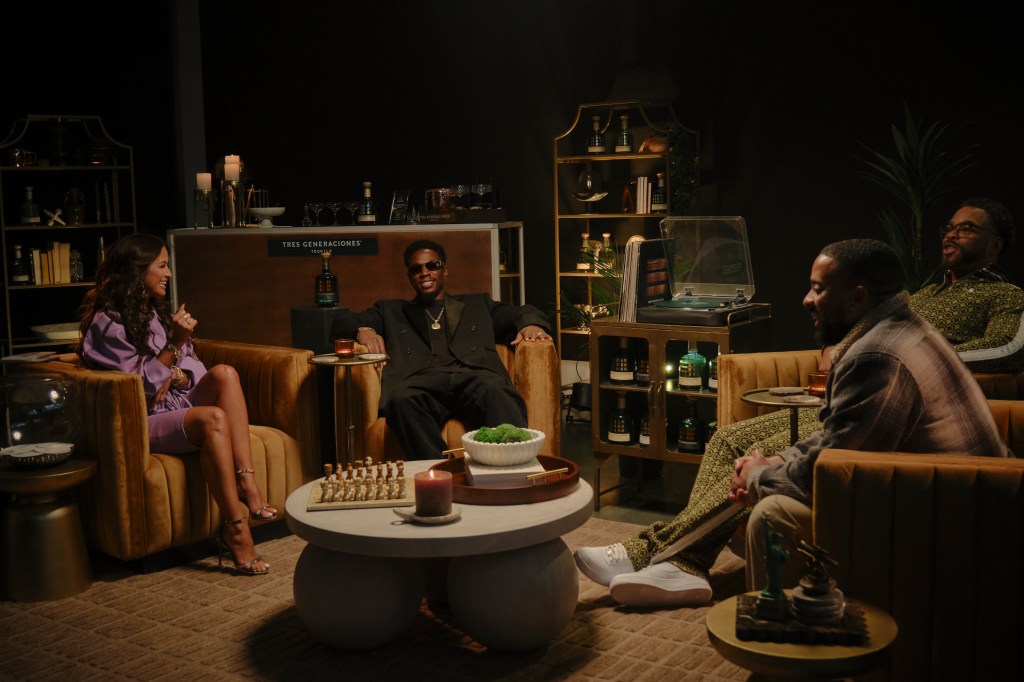Few songs stand the test of time, notable for their infectious beats, experimental sounds, soulful lyrics, or enduring appeal that make them classics. In collaboration with Tres Generaciones Tequilaa brand that champions the journey and not just the destination, we're on an exploration to gather this year's top Get Up Anthems from these six cities: Houston, Atlanta, New York, Chicago, Miami and Los Angeles. Guided by curated panels, we delve into each city's sonic history, highlighting tracks that embody resilience, authenticity and innovation, and celebrate music's power to inspire listeners to get up and pursue their passions, in the spirit of perseverance.
Get Up Anthems from New York was created through a blend of editorial expertise, data-driven analytics, social impact and personal emotion to create a stimulating conversation of the songs that inspired, captivated and energized the city. In a historical dive from 1973 until today, the playlist of the city [click HERE to play] features hometown hits synonymous with the city's rich history and culture.

RASHIDA ZAGON
Amidst the lively maelstrom of 5th Avenue, where the heartbeat of the city beats through the busy streets and perpetual traffic, a hidden enclave of artistic fervor thrives. In a secluded studio in the heart of New York, Method Man and Joey Bada$$ got together with Billboard editor Carl Lamarre to celebrate the city's unparalleled musical heritage. As the conversation unfolded over Tres Generaciones Tequila's New York City signature: The Trespresso Martini, Rocsi Diaz deftly steered the heated debate over some of the city's most iconic anthems.
Check out some of the most talked about Get Up Anthems for New York:
“Put Your Hands Where My Eyes Can See” – Busta Rhymes (1997)
Produced by Shamello and Buddah, the beat is characterized by its sparse, hypnotic production, using subtle bass lines and percussion rather than the bombastic sound that characterizes Busta's previous work. It was a stylistic departure, drawing inspiration from African rhythms and early funk influences, which complemented Busta's smooth, almost whispered delivery. This change in sound helped the track stand out When disaster strikes and became a signature song in the late 90s New York club scene.
“Hard Knock Life (Ghetto Anthem)” – Jay-Z (1998)
Jay-Z's “Hard Knock Life (Ghetto Anthem)” is a brilliant fusion of Broadway and hip-hop that changed the genre in 1998. It was featured on the rapper's third studio album, Vol. 2… Hard Knock Life, and produced by The 45 King, the song cleverly samples “It's the Hard Knock Life” from the musical Annie. Jay-Z's razor-sharp lyricism, detailing the trials and tribulations of street life, struck a chord with the general public, rocketing the track to No. 15 on the Hot 100. This song not only expanded the reach of Jay- Z but also showcased his ability to ground-breaking sampling and storytelling.
“I'll Be There For You/ You're All I Need to Get By” – Method Man feat. Mary J. Blige (1995)
“I'll Be There For You/ You're All I Need to Get By” is a timeless collaboration between Method Man and Mary J. Blige, released in 1995. It was featured on Method Man's debut album, Ticalthis track, produced by RZA, Puffy and Trackmasters, seamlessly blends hip-hop and R&B, sampling the classic Marvin Gaye and Tammi Terrell duet. The chemistry between Method Man's hard-hitting lyrics and Mary J. Blige's soulful chorus created a magic that earned them a Grammy Award for Best Rap Performance by a Duo or Group, making it a beloved '90s classic.
“NY State of Mind” – Nas (1994)
Nas' “NY State of Mind” from his landmark debut album, Illmaticreleased in 1994, is a gritty, cinematic depiction of life in New York. Produced by DJ Premier, the track features a haunting piano loop and Nas' sharp lyricism, painting vivid images of urban struggle and resilience. Although not released as a single, “NY State of Mind” is hailed as one of the greatest hip-hop songs of all time, showcasing Nas's storytelling prowess and the raw, unfiltered essence of the streets.
“Quiet Storm (Remix) – Mobb Deep feat. Lil Kim (1999)
The original “Quiet Storm” was produced by Havoc, one half of Mobb Deep, known for creating dark, melodic beats with an atmospheric intensity, a hallmark of East Coast hardcore rap. The remix, featuring Lil' Kim, breathed new life into the song, adding to her gritty delivery and cementing her as a staple in the New York rap scene. The production, with its haunting loop, matched the raw street narratives that defined Mobb Deep's Murda Muzik album, becoming a radio and New York club favorite.
“Bodak Yellow (Money Moves)” – Cardi B (2017)
Produced by J. White Did It, the beat of “Bodak Yellow” was built around heavy 808s and a menacing piano riff, providing a powerful bass sound that matched Cardi B's aggressive flow. The track was created while Cardi was still an up-and-coming artist in the Bronx, and his minimalist trap-style production echoed the southern hip-hop sound that dominated the charts at the time. “Bodak Yellow” became a smash hit, catapulting her from local fame to global stardom, marking a major moment in the city's rap comeback.
“Ruff Ryders' Anthem” – DMX (1998)
“Ruff Ryders' Anthem” is an adrenaline-pumping scream from DMX's 1998 debut album, It's dark and hell is hot. Produced by Swizz Beatz, the track's aggressive beat and DMX's ferocious delivery captured the raw energy of the streets, making it an instant hit. Peaking at No. 94 during its initial release, the anthem re-entered the Hot 100 in 2021 following DMX's untimely passing, peaking at No. 16. This track remains a testament to DMX's explosive talent and lasting influence on kind.
“CREAM (Cash Rules Everything Around Me)” – Wu-Tang Clan (1993)
A cornerstone of hip-hop, Wu-Tang Clan's “CREAM (Cash Rules Everything Around Me)” is an indelible part of their 1993 breakthrough album. Enter Wu-Tang (36 Chambers). Crafted by the genius of RZA, this track's minimalistic yet catchy piano riff underlines Raekwon and Inspectah Deck's piercing lyrics. The song's exploration of financial struggle and ambition resonated with countless listeners, encapsulating the raw, unfiltered ethos of the Wu-Tang Clan and the reality of life on the road.
“Still Not a Player” – Big Pun feat. Joe (1998)
Big Pun's “Still Not a Player” featuring Joe is quintessential late '90s hip-hop that exudes smooth charisma and undeniable charm. Released in 1998 as part of his debut album, Death penaltythis track, produced by Knobody and Dahoud Darien, is a masterful blend of hardcore rap and R&B. Sampling Brenda Russell's “A Little Bit of Love,” the song's irresistible groove and Pun's clever wordplay captivated audiences, soaring to No. 24 on the Hot 100. This track is a testament to Big's larger life Pun and his amazing persona lyrical talent.
“Dior” – Pop Smoke (2019)
Featuring a signature dark, foreboding beat with throbbing 808s and a minimalistic piano loop, the 2019 record, produced by UK drill producer 808Melo, sets the tone for Pop Smoke's deep, raspy vocals. This production style was instrumental in introducing the Brooklyn drill sound, heavily influenced by UK drill music, to a wider American audience. The track's success was instrumental in spreading drill music beyond New York and was a staple of Meet Woo and Shoot for the stars, aim for the moon.
“Paid In Full” – Eric B. & Rakim (1987)
The title track from Paid in Full revolutionized hip-hop production by pioneering the use of sampling. Eric B. sampled The Soul Searchers' “Ashley's Roachclip,” adding a prominent bassline and minimalist percussion. Rakim's smooth, complex lyricism was groundbreaking, breaking away from the simpler rhymes of early rap and influencing a new generation of New York MCs. The song's innovative production and lyrical sophistication helped establish the duo as legends in the golden age of New York hip-hop.
“Hot Boy” – Bobby Shmurda (2014)
Bursting onto the scene in 2014, Bobby Shmurda's “Hot Boy” (often stylized as “Hot N—a”) was a nuclear hit in the hip-hop world and the streets of Brooklyn. Featured on his debut EP, Shmurda wrotethe track, produced by Jahlil Beats, showcases Bobby's electrifying delivery over a beat that's both infectious and relentless. The song's virality was fueled by the iconic “Shmoney Dance”, which took social media by storm. Peaking at No. 6 on the Billboard Hot 100, “Hot Boy” wasn't just a hit — it was a cultural phenomenon that marked Bobby Shmurda's entry into the rap game.
“Lean Back” – Terror Squad feat. Fat Joe & Remy Ma (2004)
Produced by Scott Storch, the beat for “Lean Back” was built around a prominent Middle Eastern-inspired string melody and a heavy, slow bassline that made it instantly recognizable. Storch was known for mixing hip-hop with cinematic, orchestral elements and this track was no exception. The simplicity and catchiness of the production helped it become a club anthem. Released on Terror Squad's True story album, the song's success was instrumental in keeping New York on the hip-hop map at a time when southern rap dominated the charts.
Watch the full discussion HERE and recreate the cocktails that fueled the discussion at home! And be sure to catch up on all the content for the Get Up Anthems series HERE





